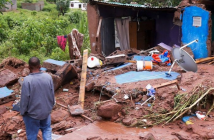Climate change is upon us and is starting to affect the everyday lifestyle of the ordinary South African. None more so than in Cape Town where responsible citizens are now flushing their toilets with a bucket system using grey water or water collected from water points such as mountain streams or natural springs. When one considers that just over 30% of the world’s carbon emissions come from buildings, what impact has the Green Building Council South Africa (GBCSA) made on reducing carbon emissions in South Africa?
Looking at the history of the Green Building Council South Africa (GBCSA) and its leadership profile over the years, it is clear that it was set up by property developers and related building industry stakeholders. The model is reliant on membership fees and sponsorship income to survive.
According to Dorah Modise, CEO of the GBCSA, as a Non-Profit Organisation, the GBCSA builds and leverages on collaborative relationships and support from key stakeholders to drive the green building movement forward. She adds that most of the support is received “in kind”, and this may be through professional advisory and consultancy services.
The problem is that some of the collaboration and financial support comes from sponsors that have their building development projects accredited by the GBCSA or are involved in the accreditation through consultancy services. Some GBCSA board members also represent companies whose buildings are accredited by the GBCSA. Without any independently measured building performance (published) in the 10-year existence of the GBCSA, questions are raised regarding credibility, ethics, and impartiality. Does the GBCSA serve their sponsors or the environment?
The GBCSA are definitely not green puppets. They have a highly qualified and professional team led by Dorah Modise. Manfred Braun, their Chief Technical Officer & Executive Director is arguably the most qualified green building specialist in the country. However, public perception is that they are not green warriors either.
Up until now, their rating tool model has been designed to slowly push the building industry towards best sustainability practice, and over time becoming increasingly rigorous and stringent – using performance and prescriptive credit criteria. However, the effects of climate change are now accelerating the need for measured performance. The public want to see results.
The GBCSA Net Zero/Net Positive Tool, launched towards the end of 2017, can go along way in addressing the general public concerns over credibility. The pilot tool awards projects which go beyond the partial reductions recognised in the current GBCSA tools, and have taken the initiative to reach the endpoint of completely neutralising or positively redressing their impacts. Projects are able to achieve Net Zero/Net Positive Ratings in carbon, water, waste, and ecology. Net Zero certification is awarded over and above any Green Star certification, a project already has.
If the tool is applied with impartiality using independent consultants who provide accurate reporting on performance, the GBCSA and their sponsors will become true green warriors. Property developers will be able to back up their green stars with performance statistics. The GBCSA will also have a database of measured performance to compare, review and improve upon, in relation to their rating tools.
Author: Bryan Groenendaal















